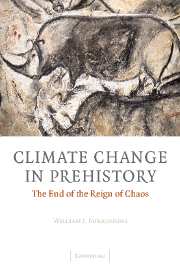Book contents
- Frontmatter
- Contents
- Preface
- Acknowledgements
- 1 Introduction
- 2 The climate of the past 100 000 years
- 3 Life in the ice age
- 4 The evolutionary implications of living with the ice age
- 5 Emerging from the ice age
- 6 Recorded history
- 7 Our climatic inheritance
- 8 The future
- Appendix Dating
- Glossary
- References
- Bibliography
- Index
1 - Introduction
Published online by Cambridge University Press: 06 August 2009
- Frontmatter
- Contents
- Preface
- Acknowledgements
- 1 Introduction
- 2 The climate of the past 100 000 years
- 3 Life in the ice age
- 4 The evolutionary implications of living with the ice age
- 5 Emerging from the ice age
- 6 Recorded history
- 7 Our climatic inheritance
- 8 The future
- Appendix Dating
- Glossary
- References
- Bibliography
- Index
Summary
Chaos umpire sits,
And by decision more embroils the fray
By which he reigns: next him high arbiter
Chance governs all.
John Milton (1608–1674), Paradise LostThere is a cosy notion that progress is a natural consequence of the development of human social structures. Reinforced by the rise of Europe from the Middle Ages and the subsequent exploitation of the New World, it is all too easy to forget past setbacks. ‘Dark Ages’ have punctuated the recorded history of our species. The period following the decline and fall of the Roman Empire is probably the best-known example, but sudden and catastrophic declines of earlier ancient civilisations are important reminders that progress is not an automatic part of the human condition. In popular culture this simple onward and upward view of human development extends back into the Palaeolithic: as the Earth gradually emerged from the ice age the human race stumbled from its caves and started its ascent to civilisation as we know it. While this is a parody of our current understanding about what really happened, it still lurks deep within our cultural subconscious. What it loses sight of is the extent of intellectual development that had been established in prehistory (Rudgley, 1998). In some instances discoveries were made independently at different places and at different times. These punctuated developments may have been a consequence of climatic events, and this tortuous process is part of the story explored.
- Type
- Chapter
- Information
- Climate Change in PrehistoryThe End of the Reign of Chaos, pp. 1 - 17Publisher: Cambridge University PressPrint publication year: 2005



